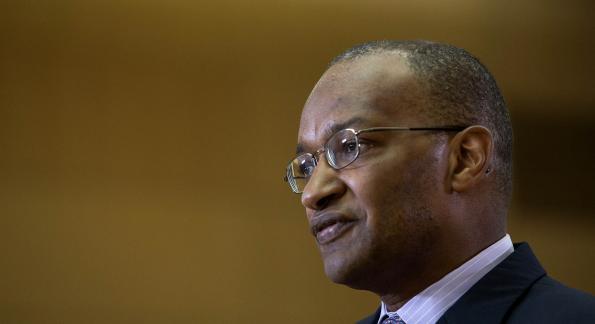
If M-PESA a Swahili word synonymous with mobile money transfer makes it to the official English language, perhaps it will be thanks to Professor Njuguna Ndung'u, the Central Bank governor (2007-2015) who oversaw its development in Kenya. In just six years, the number of financially excluded in Kenya de-creased from 60% to 25%[i] (Manson 2013) drawing the attention of not just the International Monetary Fund (IMF) but of the World Bank as well.
However, since the end of his term, it is not this governor that Kenyans are excited about, but Dr. Patrick Njoroge the current governor who will soon complete his first year in the position. Publicly unknown in his country before his election, he holds a PhD in Economics from Yale University, and he had been working for the IMF since 1995, rising to be a key advisor for Deputy Managing Director Mitsuhiro Furusawa. Public vetting by parliament revealed that at 54, he had no investments in Kenya and therein, near zero conflicts of interest. However, it has been his refusal of most trappings of his post, such as a palatial mansion and new cars that won him people's hearts. A look into Kenya's history reveals why; in the Goldenberg scandal (1991-1993) US$643m, equivalent to 10% of the country's annual GDP at the time was lost from the government coffers (Ajulu 2001). Many players were involved, not least of which was the country's central bank that made compensation payments for purportedly exported gold and diamonds although the country produces neither.
It is for this reason that Patrick Njoroge's example is so compelling to Kenyans, with many sending letters and messages to media houses (Abook 2016; Kenya Citizen TV 2016). However, he has no false illusions that the job at hand is difficult, although he will bring to bear his vast experience from Washington a position that took him world over fixing economies. Although he believes that the Kenyan Central Bank is good, his intention is to make it world-class: from bank supervision, internal procedures and transparency. He admits that one of the the surprises of his job is political pressure. Stating that on a scale of 1 to 10, he would have expected a six, but has had to deal with an eight (Ellis 2016). He explains that whereas Kenya's central bank is autonomous, it is still beholden to the government. This structure translates to a dominance of the state in the economy such that fiscal and monetary policies are closely related to a level that the political economy dimension is manifested in many areas of the the bank's activities (Doya and Mayeda 2015).
He raised interest rates by 150 basis points to 11.5% soon after taking office and tightened liquidity strengthening the shilling after it fell 8.7% to the dollar in the first half of 2015. Two banks, Dubai Bank and Imperial Bank, have been put under receivership. A third, Chase Bank, has been reopened under management of one of the local banks KCB less than a month later after being put under receivership (Stevis 2016). The governor is also attuned to international issues. Speaking on the question of Brexit, he said, "We are connected to all external markets. If there is any volatility there, it will affect us. We haven't taken out insurance on volatility, so markets will punish everybody, because there will be nowhere to hide" (Nyambura-Mwaura 2016). While his final legacy will be determined with time, his willingness to break the mold is reason to not just be attentive, but enthusiastic about what effective leadership can bring to bear on Kenya's Central Bank and its development in general.
References
Abook, B. (2016, May 6). Governor of central bank is role model for the young [Letter to the editor]. Daily Nation, p. 16.
Ajulu, R. (2001). Kenya: one step forward, three steps back: the succession dilemma. Review of African Political Economy, 28 (88), 197{212.
Doya, D. M. & Mayeda, A. (2015, December 2). Meet the central governor who isn't much impressed by money. Bloomberg. Retrieved from http : //www .bloomberg. com/news /articles/ 2015- 12- 02 /meet - the- central-bank-governor-who-isn-t-much-impressed-by-money
Ellis, E. (2016, April). Kenya central bank governor Njoroge: calling it as he sees it. Euromoney. Retrieved from http://www.euromoney.com/Article/ 3542982/Kenya- central- bank- governor- Njoroge- Calling- it- as- he- sees-it.html
Kenya Citizen TV. (2016, March 2). Business Center One on One with CBK governor, Dr Patrick Njoroge. Retrieved from https://www.youtube.com/ watch?v=Y 9L8P7TSvI
Manson, K. (2013, November 25). Mobile phones are route to financial inclusion for Kenyans. Financial Times. Retrieved from https : / / next . ft . com / content/6cd723d8-5049-11e3-9f0d-00144feabdc0
Nyambura-Mwaura, H. (2016, April 28). Kenya central bank sees Brexit as worst risk facing economy. Bloomberg. Retrieved from http://www.bloomberg. com / news / articles / 2016 - 04 - 28 / more - brexit - is - biggest - risk - facing - kenyan-economy-njoroge-says
Stevis, M. (2016, April 20). Chase Bank Kenya to be managed by local lender KCB Bank. The Wall Street Journal. Retrieved from http://www.wsj. com/articles /chase- bank- kenya- to - be - managed - by- local - lender - kcb-bank-1461141788






